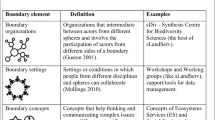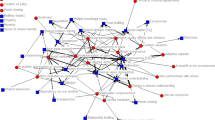Abstract
Environmental research is characterized in each of its successive phases by a strong interdisciplinarity. A rotational groups system (RGS) method is proposed as an instrument to encourage interaction among researchers from fields that are traditionally far apart. Meetings conducted with the RGS procedure involve all the researchers, who, in repeated and topical encounters, are able to exchange information on a wide variety of environmental subjects. These meetings can be arranged according to a special calendar, through a series of phases treating different aspects of the same subjects to be discussed, and above all, referring to specific “themes” and “working guidelines” organized on the basis of criteria designed to favor an exchange of ideas and constructive discussion. At the end, the plenary assembly edits an overall resume of the proceedings, and votes on the final resolution, which brings together all the conclusive opinions regarding the themes discussed.
Similar content being viewed by others
Literature cited
Beller, W. S. (ed.). 1987. Proceedings of the interoceanic workshop on sustainable development and environmental management of small islands. Puerto Rico, November 1986. US Man and Biosphere Program and US Department of State, Washington, DC, 116 pp.
Bonnicksen, T. M., and R. H. Becker. 1983. Environmental impact studies: An interdisciplinary approach for assigning priorities.Environmental Management 7:109–117.
d'Ayala, P. G. 1984. Principles and methods of interdisciplinarity and transectoral training of human settlement managers. The integrated management of human settlements. UNESCO, Paris.
d'Ayala, P. G., and M. Wynn. 1986. Handbook for the design and organization of training courses (revised version). Pages 1–90in Human settlements managers training programme. MAB-UNESCO-CIREA, Parma, Italy.
Giavelli, G., and O. Rossi. 1984. Some problems related to an environmental factual database: The case Aeolian project.International Journal of Environmental Studies 22:217–224.
Giavelli G., O. Rossi, and L. Soliani. 1987. The Aeolian archipelago project: Working strategies for effective environmental research.Ekistics 54:137–142.
Miller, A. 1982. Tunnel vision in environmental management.The Environmentalist 2:223–231.
Moroni, A. 1977. Interdisciplinarity and environmental education.Prospects 8:480–542.
Morris, R. M. 1977. The systems approach in teaching resource planners.Agricultural Systems 2:227–237.
Nijkamp, P., and A. van Delft. 1977. Multi-criteria analysis and regional decision-making. Martinus Nijhoff, Dordrecht, 135 pp.
Perkins, R. J. 1978. Information theory and ecology.International Journal of Ecological and Environmental Science 4:61–73.
UNESCO. 1973. Expert panel on project 7: Ecology and rational use of island ecosystems (final report). Programme on Man and the Biosphere (MAB). UNESCO, Paris.
Voogd, H. 1982. Multicriteria evaluation with mixed qualitative and quantitative data.Environment and Planning 9:221–236.
Wynn, M. 1983. Forest management and biomass utilization. Interdisciplinary research seminar using the rotational groups systems method. Report No. 1 on interdisciplinary training programme for human settlement managers. UNESCO, Paris. 87 pp.
Author information
Authors and Affiliations
Rights and permissions
About this article
Cite this article
Giavelli, G. A rotational groups system approach for interdisciplinary research. Environmental Management 13, 425–433 (1989). https://doi.org/10.1007/BF01867676
Issue Date:
DOI: https://doi.org/10.1007/BF01867676




